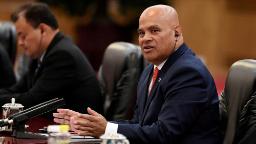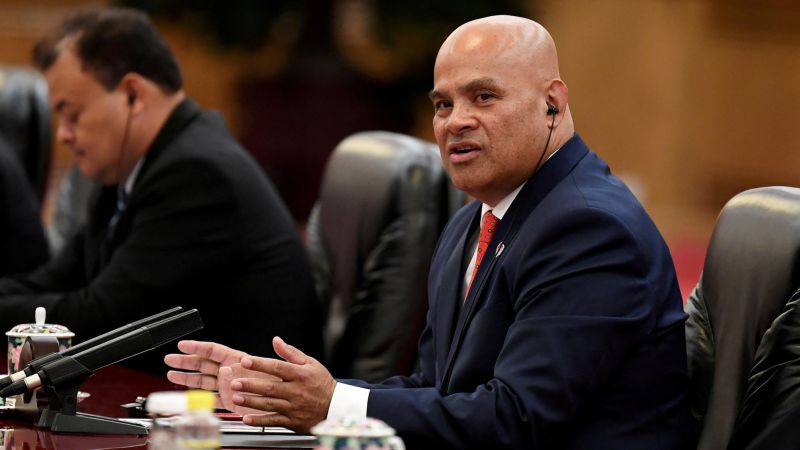
Hong Kong
CNN
—
The outgoing president of Micronesia has accused China of engaging in “political warfare” in the Pacific, in an explosive letter advocating for the the dissolution of diplomatic ties with Beijing.
In the 13-page letter, which CNN has obtained, David Panuelo alleges China is preparing to invade the self-ruled island of Taiwan, and has engaged in bribery, political interference and even “direct threats” to ensure the Federated States of Micronesia (FSM) remains neutral in the event of war.
China dismissed the letter’s contents as “smears and accusations.”
“I would like to emphasize that China has always upheld the equality of all countries – no matter their size – and has always respected how Micronesia chooses its own development, based on its own circumstances,” Chinese Foreign Ministry spokesperson Mao Ning said Friday in a regular press briefing.
Panuelo, who has previously been critical of Beijing’s actions in the Pacific region, revealed he had considered switching diplomatic recognition to Taipei.
“China is seeking to ensure that, in the event of a war in our Blue Pacific continent between themselves and Taiwan, that the FSM is, at best, aligned with the PRC (China) instead of the United States, and, at worst, that the FSM chooses to ‘abstain’ altogether,” he wrote.
The Chinese Communist Party claims the self-ruling democracy of Taiwan as its own territory – despite having never governed it – and has refused to rule out the use of force to “reunify” it with mainland China.
Panuelo also accused China of “political warfare” in his country, which he claimed included overt activities – such as political alliances, economic measures and public propaganda – and clandestine acts such as “bribery, psychological warfare, and blackmail”.
“One of the reasons that China’s political warfare is successful in so many arenas is that we are bribed to be complicit, and bribed to be silent. That’s a heavy word, but it is an accurate description regardless,” he wrote in the letter.
CNN has reached out to Panuelo and Taiwan’s foreign ministry for comment.
Panuelo, whose term in office is set to expire in two months after losing his seat in the recent general election, has been president of Micronesia since 2019.
He has previously spoken out on China’s growing influence in the South Pacific, including warning against Beijing’s proposal of a sweeping regional security deal with 10 Pacific Island nations.
Last May, in a separate letter to 22 Pacific leaders seen by CNN, Panuelo said the draft proposal was intended to shift Pacific Island nations with diplomatic ties to China “very close into Beijing’s orbit.”
He argued that in addition to impacting the sovereignty of Pacific Island nations, signing such an agreement could bring about a new “Cold War” amid tensions between China and the West.
China ultimately failed in its bid to strike the security pact with Pacific Island nations.
The release of Panuelo’s latest – and most explosive – letter comes amid heightened concern from regional powers over Beijing’s ambitions in the Indo-Pacific.
The Pacific Islands’ location, largely to the northeast of Australia, means the island nations have long been viewed by military strategists as a vital connecting thread between the US territory of Guam and US-allied Australia.
Both the US and Australia are wary of a China that has grown increasingly assertive in the South China Sea extending its reach further west into Pacific waters, including toward the FSM, an archipelago of more than 600 islands.
Meanwhile, the island nations themselves – typically more concerned about the ravages of climate change than geopolitics – have been wary of being viewed as pawns in a great power struggle.
China’s interest in building rapport with the Pacific Islands countries is not new.
In the early 2000s, as the US was turning its attention toward perceived threats in the Middle East, a newly outward-looking China was starting on a path to become an economic and diplomatic partner for Pacific island countries.
A focal point of Beijing’s outreach was to win friends away from Taiwan, which is now only formally recognized by four of 14 South Pacific nations, after the Solomon Islands and Kiribati switched allegiance to China in 2019.
In recent years, as Beijing has pursued a more assertive foreign policy and expanded development funding globally in a bid to enhance its international sway, its visibility in the Pacific Islands, too, has grown.
China has backed widely publicized projects in some Pacific Island countries – a national sports stadium to host the Pacific Games in the Solomon Islands, highways in Papua New Guinea, bridges in Fiji – and sent high-level envoys to the region, including two visits from Chinese leader Xi Jinping, once in 2014 and again in 2018.
It’s also become a major trading partner for Pacific Island economies.
(Except for the headline, this story has not been edited by PostX News and is published from a syndicated feed.)

